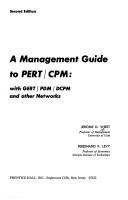| Listing 1 - 5 of 5 |
Sort by
|
Book
ISBN: 2704406235 9782704406234 Year: 1979 Volume: 28 Publisher: Paris Entreprise Moderne D'edition
Abstract | Keywords | Export | Availability | Bookmark
 Loading...
Loading...Choose an application
- Reference Manager
- EndNote
- RefWorks (Direct export to RefWorks)

ISBN: 0135491053 9780135491058 Year: 1977 Publisher: Englewood Cliffs (N.J.): Prentice Hall
Abstract | Keywords | Export | Availability | Bookmark
 Loading...
Loading...Choose an application
- Reference Manager
- EndNote
- RefWorks (Direct export to RefWorks)
Planning (firm) --- Computer. Automation --- 519.8 --- Operational research --- 519.8 Operational research --- Critical path analysis --- PERT (Network analysis) --- Program evaluation and review technique --- Network analysis (Planning) --- CPM (Network analysis) --- Critical path method --- Path analysis, Critical
Book
ISBN: 2040074481 9782040074487 Year: 1974 Publisher: Paris : Dunod,
Abstract | Keywords | Export | Availability | Bookmark
 Loading...
Loading...Choose an application
- Reference Manager
- EndNote
- RefWorks (Direct export to RefWorks)
PERT (Network analysis) --- 519.8 --- 519.8 Operational research --- Operational research --- Program evaluation and review technique --- Network analysis (Planning) --- PERT, Méthode. --- PERT (Network analysis). --- #ABIB:dd.prof.E.TOLLENS --- Méthode PERT.
Book
ISBN: 0585484910 9780585484914 Year: 2003 Publisher: [Place of publication not identified] University of New South Wales Press
Abstract | Keywords | Export | Availability | Bookmark
 Loading...
Loading...Choose an application
- Reference Manager
- EndNote
- RefWorks (Direct export to RefWorks)
Production scheduling --- PERT (Network analysis) --- Project management --- Construction industry --- Building --- Industrial project management --- Management --- Program evaluation and review technique --- Network analysis (Planning) --- Job scheduling (Production control) --- Job-shop scheduling --- Project scheduling (Production control) --- Scheduling (Management) --- Production control --- Scheduling --- E-books
Book
ISBN: 9781462536337 1462536336 9781462532759 1462532756 Year: 2019 Publisher: New York London The Guilford Press
Abstract | Keywords | Export | Availability | Bookmark
 Loading...
Loading...Choose an application
- Reference Manager
- EndNote
- RefWorks (Direct export to RefWorks)
The leading text that covers both the theory and practice of evaluation in one engaging volume has now been revised and updated with additional evaluation approaches (such as mixed methods and principles-focused evaluation) and new methods (such as technologically based strategies). The book features examples of small- and large-scale evaluations from a range of fields, many with reflective commentary from the evaluators; helpful checklists; and carefully crafted learning activities. Major theoretical paradigms in evaluation—and the ways they inform methodological choices—are explained. Readers learn effective strategies for clarifying their own theoretical assumptions; working with stakeholders; developing questions; using quantitative, qualitative, and mixed methods designs; selecting data collection and sampling strategies; analyzing data; and communicating and utilizing findings. The new companion website provides extensive recommended online resources and tools, organized by chapter.New to This Edition Additional evaluation approaches: collaborative evaluation, principles-focused evaluation, and desk reviews. Coverage of new data collection technologies and methods of qualitative coding. Expanded discussions of logic models, cost–benefit analysis, and mixed methods designs. Many new and updated sample studies. Pedagogical Features Reflection questions that prepare students to read each chapter. "Extending Your Thinking" questions and practical activities. Boxes delving into key concepts and example studies. End-of-book Glossary, and highlighted key terms throughout. Companion website with links to helpful resources on all aspects of evaluation. (Provided by publisher)
Evaluation research (Social action programs) --- Social sciences --- Evaluation --- PERT (Network analysis) --- #SBIB:303H60 --- Program evaluation and review technique --- Network analysis (Planning) --- Assessment --- Research --- Evaluation of social action programs --- Evaluative research (Social action programs) --- Social action --- Social service --- Methodology --- Bijzondere methoden: algemeen --- Social costs. Social benefits --- Research on teaching
| Listing 1 - 5 of 5 |
Sort by
|

 Search
Search Feedback
Feedback About
About Help
Help News
News